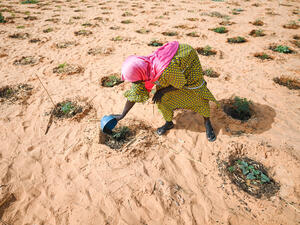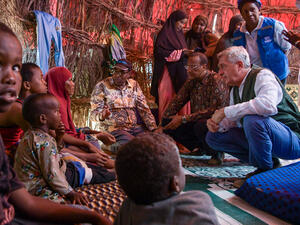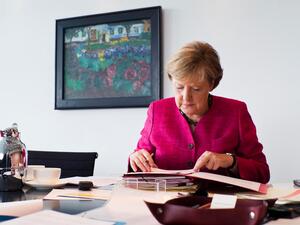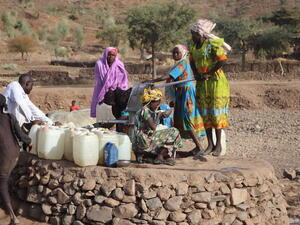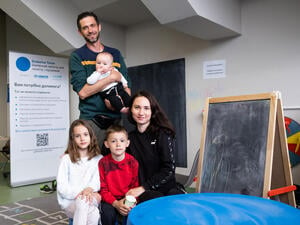Thousands continue to flee wars and cross borders in search for a new life in safety
Thousands continue to flee wars and cross borders in search for a new life in safety

Family heading to a police van in no man's land between two Croatian and Serbian border near Tovarnik (Croatia).
TOVARNIK, Croatia, Sept 25 (UNHCR) - They continue to come in their thousands, Afghans, Syrians, Iraqis and others, in an ever-shifting pattern across the Serbia-Croatia border, most fleeing conflict and persecution hoping their onward journey will deliver them to a place where they can pick up the pieces of their lives.
More than 50,000 people have arrived here since mid-September, with many more on the way. The crossing changes every day, back and forth between Bapska and Tovarnik, large numbers amassing at borders, then relieved when this human stream is allowed passage.
On Thursday they gathered at a graveyard in Tovarnik, the entry point to a no-man's land between two countries who know too well the cost of war. A few kilometres away lay the train station, scene of last week's chaos, but now they had to wait, under the sun, in the rain, for the buses and police vans to shuttle them through.
As the numbers grew, with buses insufficient in numbers, some were stuck for hours - uncertain and confused as to what lay in store. UNHCR staff kicked into emergency mode, distributing biscuits, blankets and raincoats, shuttling pregnant women to the front, and reuniting families pulled apart within the throng.
As the evening came, the rain began to fall. The crowd surged, a momentary panicked dash, but was soon brought back to calm as an Arabic speaker in a Red Cross jacket shouted orders through a megaphone. Along the line, the UN and NGOs and volunteers from all across Europe provided reassurance and what little information they could gather, perhaps the greatest need amongst a multilingual crowd who barely knew where they were.
"We were first on the ground beside the Croatian police; and our water and biscuits bought vital time before the Red Cross, NGOs and volunteers provided much needed assistance," said Ralf Gruenert, UNHCR Emergency Coordinator. "We are working on three axes: information, identifying and transporting the most vulnerable, and distributing vital assistance."
Earlier in the day, the border saw long lines of cars waiting to pass through, but then it was closed to traffic as a war of words escalated between Croatia and Serbia; a worrying sign that the fallout of foreign conflicts is reigniting old tensions on Europe's frontiers.
Fared Ahmad, a civil engineer from Kabul, was scared for his wife Fatimah, eight months pregnant, overwhelmed by exhaustion and the tension of being in the middle of a crowd. "We can't stay here," he said. "You can see how uncomfortable she is. Please can she move from here to the camp?" Maria Pamula, a UNHCR protection officer, helped take them forward, and organised for transport to shuttle them to shelter.
Back in Opatovac transit camp, Jude Lojore, 30 years old, sat on a camping mat and ate tinned fish with his fingers, awaiting his turn to move on. He described his epic journey from Kapoeta in South Sudan. A former maize trader, he decided to leave after a recent peace deal failed to quell the fighting, and his hopes for calm were dashed. He dropped his three children off with his mother in Uganda, and set off with his wife through Egypt, Libya, and across the Mediterranean Sea in an overloaded dinghy.
"It was the most difficult thing I ever did," he said. "In that small boat you are lifeless; empty," he explained. "But in Greece, life came back. I think I am much closer to God now than before."
Over days the transit camp has grown more ordered, with people now provided with coloured wrist bands, and organised tent by tent as they wait a day for the buses. But family separation remains a constant threat. A tent has been dedicated to reuniting them, but UN and Red Cross officials also comb the camp for sisters split from brothers, children from their mothers, to bring them back together before the buses move on.
Yesterday alone Mandana Amiri a UNHCR protection officer, reunited six families - one at the very last minute before the buses left. But not everybody chooses to wait. "Since yesterday I saw four families who had lost members but didn't want to stay," she said. "Today another two said they would go on without their family."
As night fell yesterday, a new convoy of buses carried grateful refugees and migrants from the centre to Tovarnik station, where they were ushered onto a waiting train.
But their destination remained unclear. "We're not sure," said one man. "First we'll try Hungary, then Slovenia, and, if not, Zagreb, at a complex at Velesajem." When asked for more details he preferred not to elaborate, insisting that Zagreb was 'only the last option.'
On Friday morning, the crossing point had shifted yet again, back to Bapska, with reports that 9000 more people were on the way. And so another day began, with no end to the flow in sight, and a small country - many former refugees themselves - worked hour by hour to handle the arrivals as best they could, learning on the fly, with dignity and respect.
By Mark Turner, Tovarnik

